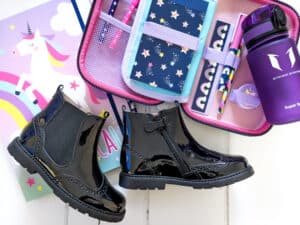AD | Affiliate Links
When your child turns one, we are well aware that they seem to spring into toddlerhood right before our eyes. They don’t seem to be the baby we nursed or held while they napped, and are now walking, attempting to talk, and are into absolutely everything. While it feels like the next chapter, it can also feel like there isn’t much time left before they start school. You might already be thinking about nursery, or maybe you are planning on keeping them home until they start.
Early years education activities
Whatever the situation is for you, the one thing you might be thinking about is how you can help them ahead of starting. There are plenty of early years education activities you can do from the age of one, and it can be a big help for them to have some grounding in knowledge before entering a new chapter of their own lives. So with that in mind, here are some of the early years education activities that you can be doing with your one, two, and three-year-old ahead of school.

Age one
When a child turns one it seems to all change, and while you are excited about the next chapter, you might be a little sad that those baby days are a distant memory. However, this stage is fun as your child is really wanting to explore and see the world. They will be interested in just about anything, so it is a great time to start introducing early years education activities to your routine. They will be starting to walk and talk, so you can help them along with some of these ideas. Here are some of the things that you could try.
Name everything
You will be wanting to encourage them to talk so this is where you should be naming everything. From the food on their plate at mealtime, to when you pass them something. For example, holding their ball, passing it to them, and saying “ball” so they know what it is. It may feel repetitive, but the more you say, the more they will pick up and understand.
Give your child a choice
It is a good idea for them to develop their own choices, so try giving them a choice of things. For example, at snack time, ask them if they want a banana or apple, or whatever it is you are offering.
Picture books
Picture books are great for this age, and as you go through each picture tell your child what it is. It may be shapes, animals, or items like a ball or toy, but they will soon start to grasp what things are. This also encourages them to sit with you and focus on something.
Puzzles
Puzzles are a great way to start helping them understand and sort things, so get a few wooden puzzles and allow them to fit the shapes back in. You can get these for numbers and shapes, so they start to recognise them early on.
Colouring
Finally, the sooner you introduce holding pens and crayons the better, so start by allowing them to colour. The STABILO Woody 3-in-1 multi-talented pencils are a great fit for little hands due to their chunky shape and size and are unique in that they can be used as a colouring pencil, watercolours and wax crayon all in one. They won’t hold it correctly, but grasping what it does is good enough for now. As they continue to do this through to school age, you will be able to help them hold the crayon or pen correctly. This will help strengthen their hands and fingers.

Age two
Age two is always a tricky age, as this is usually where the terrible twos kick in. However, communication should be a little easier, so you will find that you can start to negotiate with your child. This is also a learning curve as they begin to understand that things will not always go their way. Doing all of the above is still important, but here are a few additional early years education activities that you can add to your routine.
Do daily tasks with them
Get them involved with daily tasks and talk through what you are doing. Tell them you are putting washing in the machine, cleaning the dishes or going outside for a walk. The more you talk, the more they will start to string words together and form sentences.
Nursery rhymes and actions
You may already be singing nursery rhymes, but this is the ideal age to encourage your child to sing along and do actions to go along with them. It helps to teach your child how to listen and enables them to focus and concentrate on a specific task.
Enhance on picture books
You may be reading picture books and naming what you see, but now enhance on that by saying a colour or describing the scene. Ask questions and create a story.
Musical statues
Put on your favourite music and start to dance. Then stop the music and turn into a statue. This is a great activity to help your child listen and follow basic instructions.
Flashcards
Flashcards are also a great option at this age and give you a chance to show examples of things you may not ordinarily come across each day. Start with a few and increase over time as they get more confident with words and recognise what things are.

Age three
Now that they have turned three, you may be feeling like they are more than ready to start working towards school. So while you should carry on with everything we have already mentioned, here are a few more early years educational activities to help you move things along to have them ready for school.
Sounds and words in books
It might be time to start moving on from picture books and read more frequently books with words in. This is where you can use your finger along with the word you are reading so that your child can start to recognise some of the words. Make sure you sound things out as well.
Role-play and imaginative games
This is also the perfect age to start role play games. It might be that you have a shop, or create something that you and your child can then create a scenario from. The more imagination they use the better.
Treasure hunts/word bingo
You can also use treasure hunts and word bingo (where you need to find/spot certain objects or things) at this age. You can use the activity to ask questions and give instructions. This will help them to listen.
Conversations with open-ended questions and closed questions
When talking to your child, try and use open-ended questions. It is a great way to reaffirm what you have done, for example, “we went to the shop this morning, didn’t we?” or ask them things like “what would you like to do this afternoon?” It helps encourage them to answer questions appropriately.
Sorting games
Sorting games are a great way to help your child to learn about colours, shapes, and objects. You can create your own games by asking them to sort out the colours of toys, beads, food, etc. The options are endless.
Books for shapes
Finally, it is a good idea for you to try and help your child recognise basic shapes such as circles and squares. Using books or even household objects for this is can help.
Hopefully, these tips will help you when it comes to early years education.
Win a pack of STABILO Woody 3-in-1 Multi-Talented Pencil + Sharpener
To help ensure that your little ones are able to learn through play and let their creative side shine, we are lucky enough to have a set of Multi-talented Pencil STABILO woody 3-in-1 Wallet of 10 Assorted Colours + Sharpener to giveaway.
PRIZE: Multi-talented Pencil STABILO woody 3-in-1 Wallet of 10 Assorted Colours + Sharpener
To enter, complete the Gleam widget below, all entries are optional and each one completed will gain you more entries into the random draw.
STABILO woody 3-in-1




























